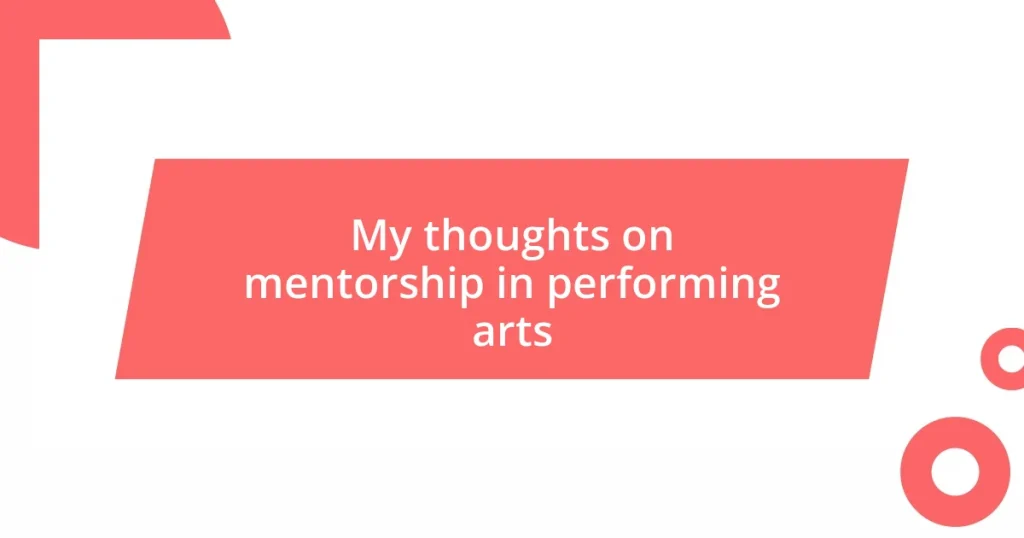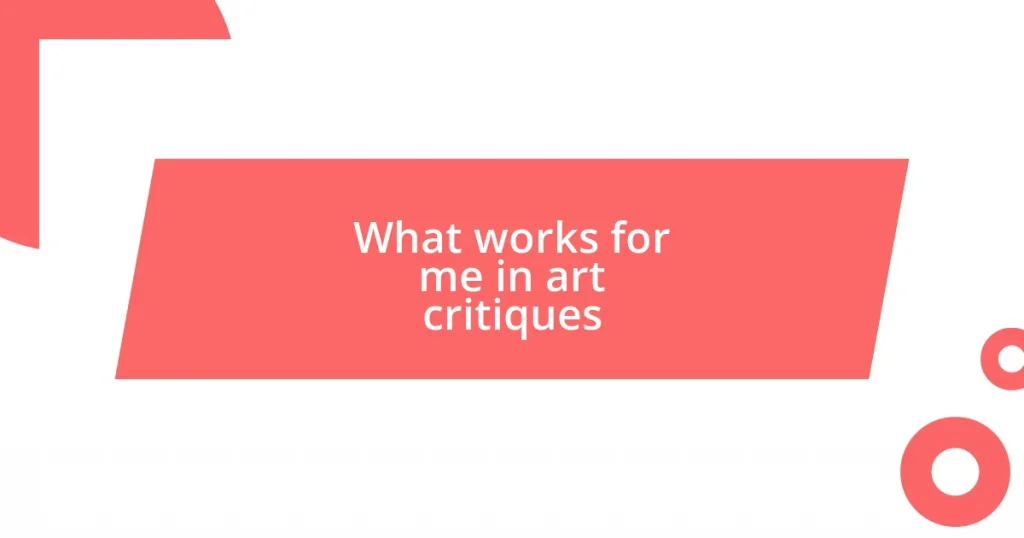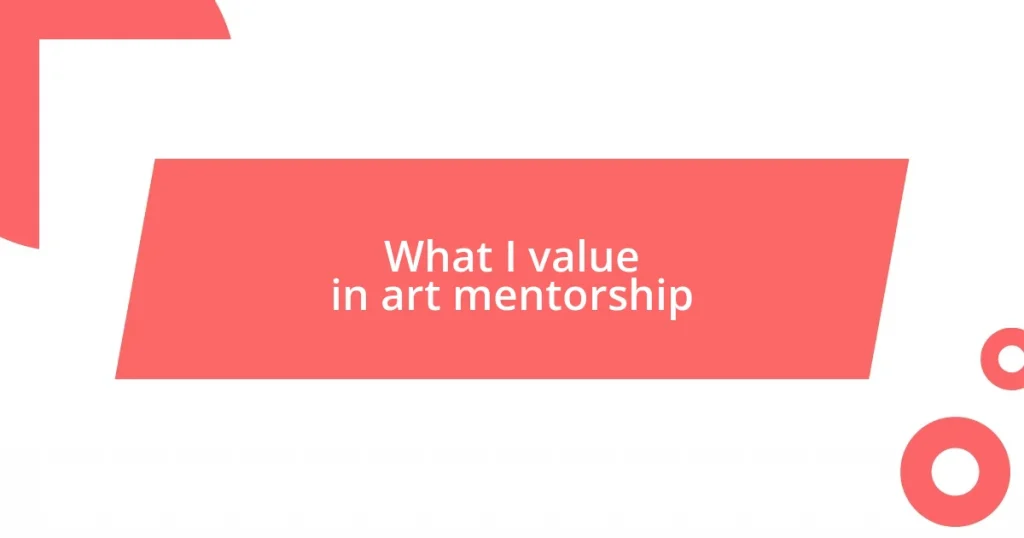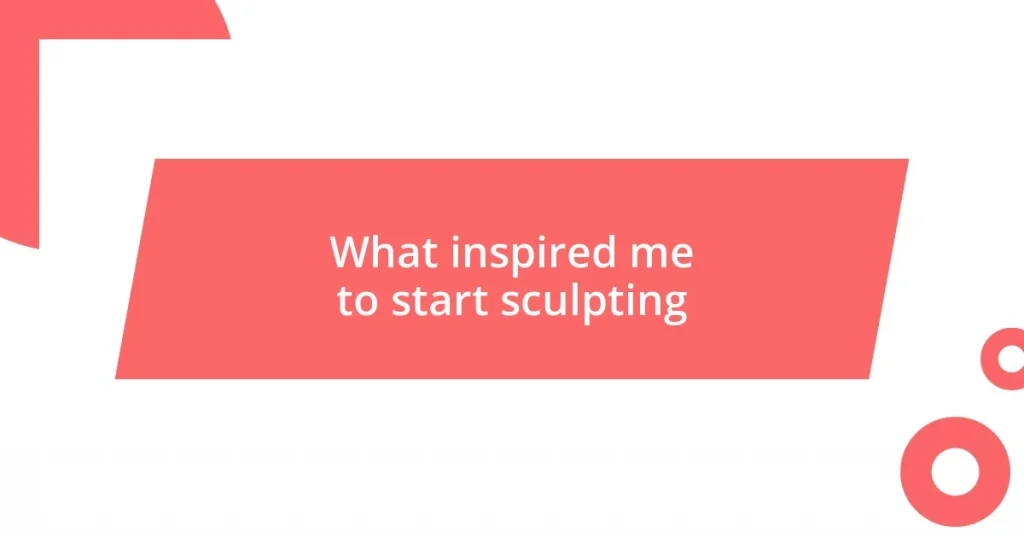Key takeaways:
- Mentorship in the arts fosters artistic growth, community, and empowerment, crucial for aspiring artists to navigate their careers.
- Finding the right mentor involves shared interests, effective communication, and mutual respect, creating a supportive environment for creativity.
- Long-term mentorship benefits include building networks, developing resilience, and shaping future career choices through goal-setting and constructive feedback.
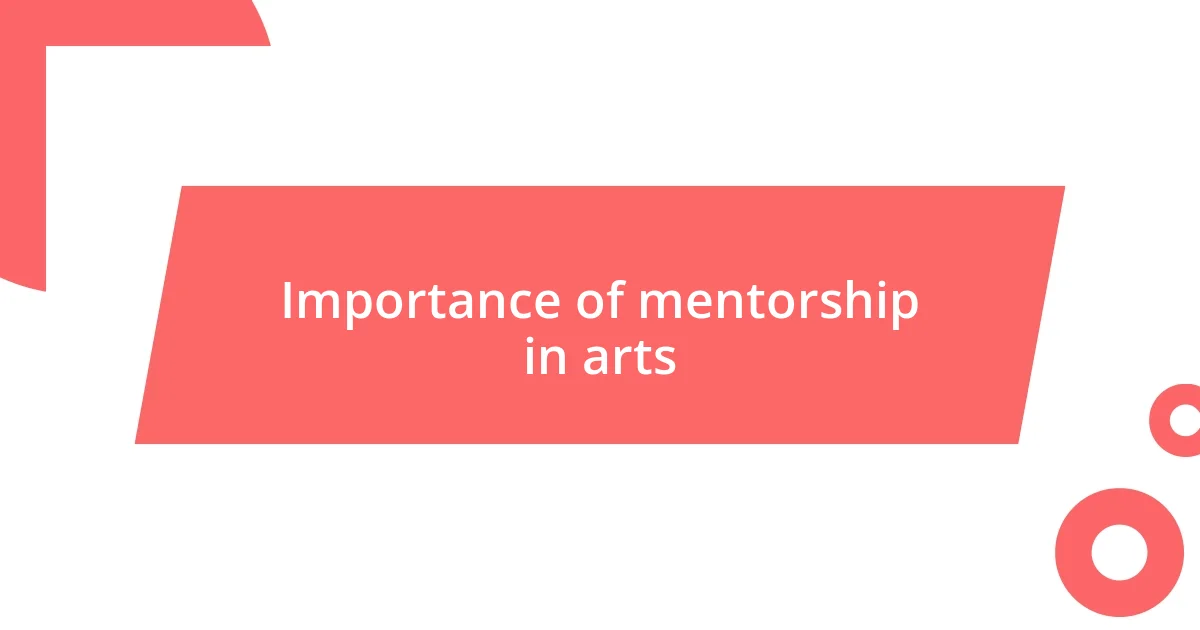
Importance of mentorship in arts
Mentorship in the performing arts acts as a guiding light for many aspiring artists. I remember when I was starting out; having a mentor who believed in my talent not only boosted my confidence but also provided me with invaluable feedback. Wouldn’t it be great if every budding artist had that kind of support to navigate the complex pathways of their careers?
The role of a mentor transcends mere guidance; it’s about building a nurturing relationship that fosters artistic growth. For instance, I once had a mentor who challenged me to step outside my comfort zone and explore different styles of performance. That experience was transformative. It made me realize how crucial it is for emerging artists to have someone who can push them to discover their full potential.
Moreover, mentorship cultivates a sense of community within the arts. It creates a space where artists can share experiences and learn from each other’s journeys. As I reflect on my own experiences, I see how mentors not only impart knowledge but also inspire a culture of collaboration. When I was collaborating with peers under the guidance of an experienced artist, it felt like we were all united in a shared purpose—didn’t that make the process so much more fulfilling?
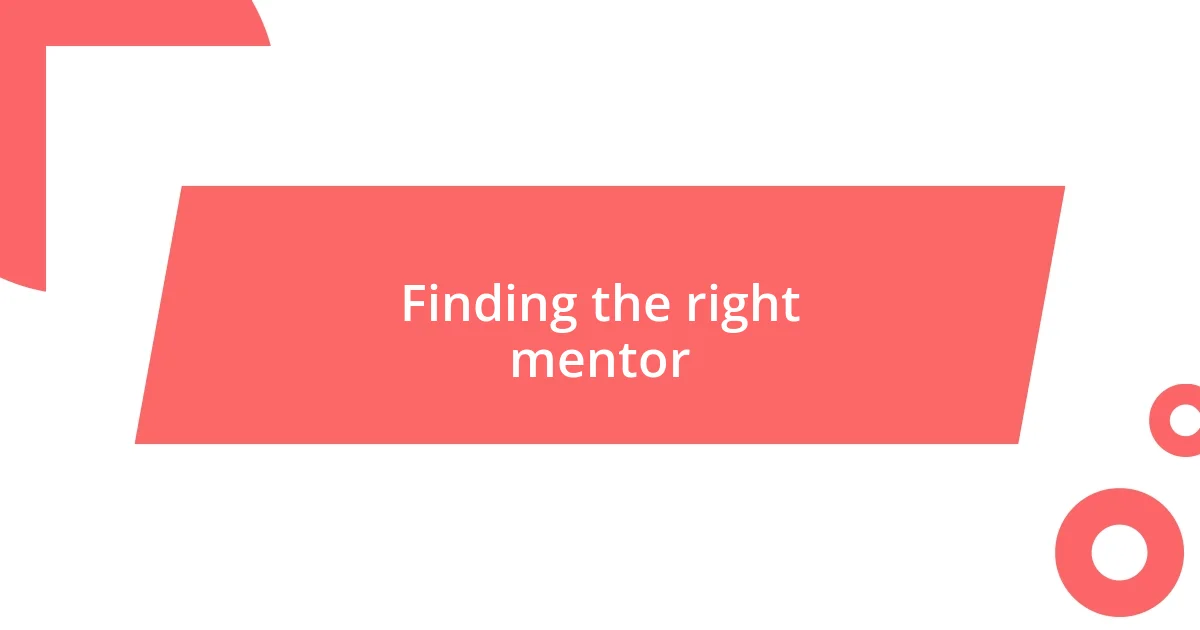
Finding the right mentor
Finding the right mentor can feel daunting. I remember feeling overwhelmed by the multitude of options when I first ventured into the arts. It’s essential to find someone who resonates with your artistic vision and values. This connection can lead to a more enriching mentoring relationship—one that feels like a partnership rather than a hierarchy.
Here are some key aspects to consider when searching for a mentor:
- Shared Interests: Look for someone whose work aligns with your artistic goals and interests. This common ground can spark meaningful conversations and insights.
- Experience Level: Ensure your mentor has the experience to guide you through the next steps of your journey.
- Communication Style: Evaluate if their way of giving feedback suits your learning style—some people thrive on directness, while others prefer a gentler approach.
- Networking Opportunities: A mentor well-connected in the industry can open doors that you may not have access to otherwise.
- Mutual Respect: A mentor should see you as an equal partner in this journey, valuing your opinions and encouraging your growth.
Ultimately, finding the right mentor is about creating a supportive environment that nourishes your creativity. Connection matters; it’s about feeling understood and empowered to take risks. Early in my career, I was lucky enough to have a mentor who asked me what my dreams were, pushing me to articulate goals I hadn’t even dared to consider. That kind of encouragement is priceless.
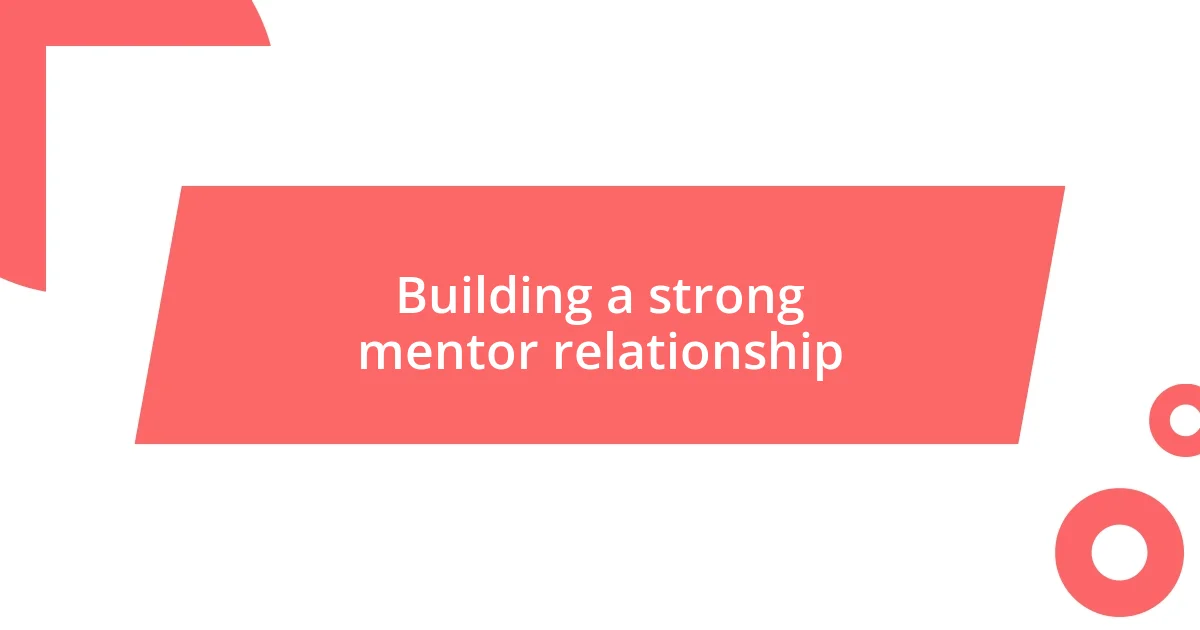
Building a strong mentor relationship
Building a strong mentor relationship takes effort and intention from both parties. It’s essential to cultivate trust and open communication from the get-go. I learned this firsthand when I first approached my mentor; I was nervous, but when I expressed my vulnerabilities, it opened a door to a deeper connection. How can we expect a mentor to guide us effectively if we’re not honest about our struggles?
Regular check-ins are vital as they allow both mentor and mentee to assess progress and recalibrate goals. During one of my own check-ins, I shared a recent setback I faced. Instead of merely offering solutions, my mentor asked probing questions that forced me to reflect. This led to a breakthrough moment for me. Have you ever had a conversation that shifted your entire perspective?
Lastly, consistently showing appreciation can go a long way in nurturing the relationship. Whether it’s sending a thank-you note or sharing how their advice impacted your journey, these gestures reinforce the bond you’re building. I vividly remember gifting my mentor a small token of appreciation after a pivotal performance; their emotional reaction reminded me of the power of gratitude in mentorship.
| Key Aspects | Explanation |
|---|---|
| Trust | Honest dialogue creates a safe space for vulnerability. |
| Regular Check-ins | Assess progress and refine goals through honest discussions. |
| Gratitude | Simple gestures of appreciation reinforce the mentor-mentee bond. |
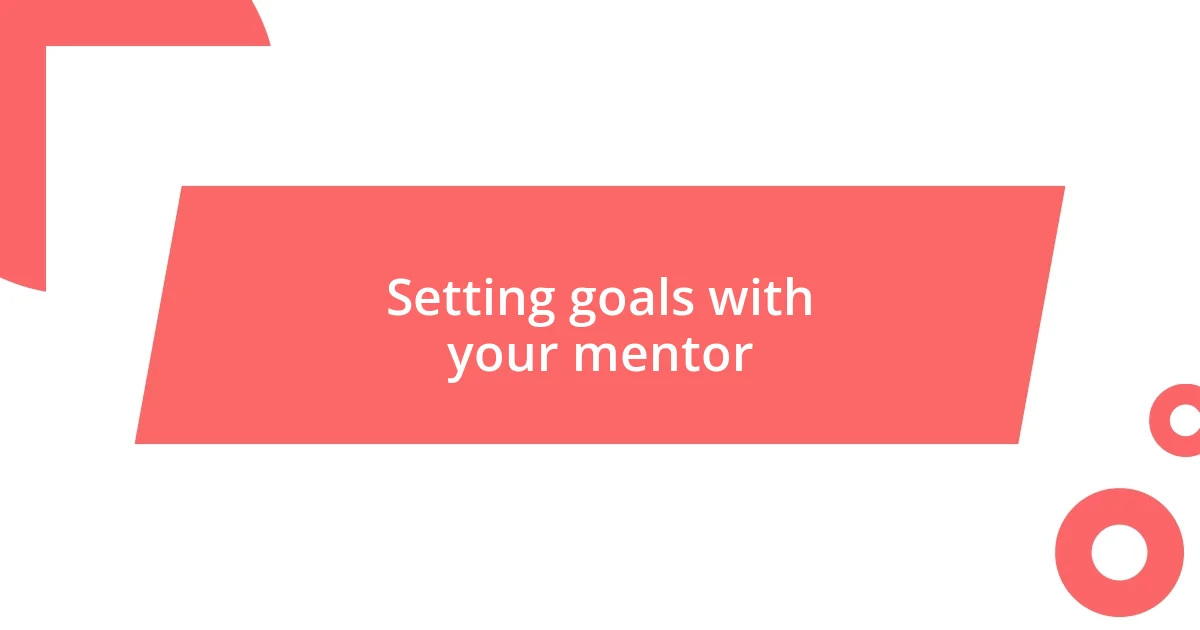
Setting goals with your mentor
Setting goals with your mentor is one of the most transformative aspects of the mentoring relationship. I still recall a session when my mentor encouraged me to reflect on what success looked like for me personally. At first, I laughed it off; who wouldn’t want to be a star? But as I began to articulate my own vision—balancing creativity with career stability—it became clear that setting specific, measurable goals was essential for my journey.
As we dove deeper into this process, my mentor introduced the idea of SMART goals—specific, measurable, achievable, relevant, and time-bound. I remember feeling a bit skeptical at first, wondering if such a structured approach would stifle my creativity. However, breaking down my ambition into these categories helped me clarify my objectives. It was a leap for sure, but turning vague dreams into actionable steps made me feel more in control of my path.
One day, after brainstorming potential goals, my mentor surprised me by asking, “What are you willing to sacrifice to reach these?” That question forced me to confront my fears and priorities, ultimately revealing that dedication requires difficult choices. For example, I found myself contemplating late-night rehearsals over casual outings with friends. It was a struggle, yet that honest dialogue made me appreciate the hard work behind achieving my dreams, making every small victory feel that much richer.
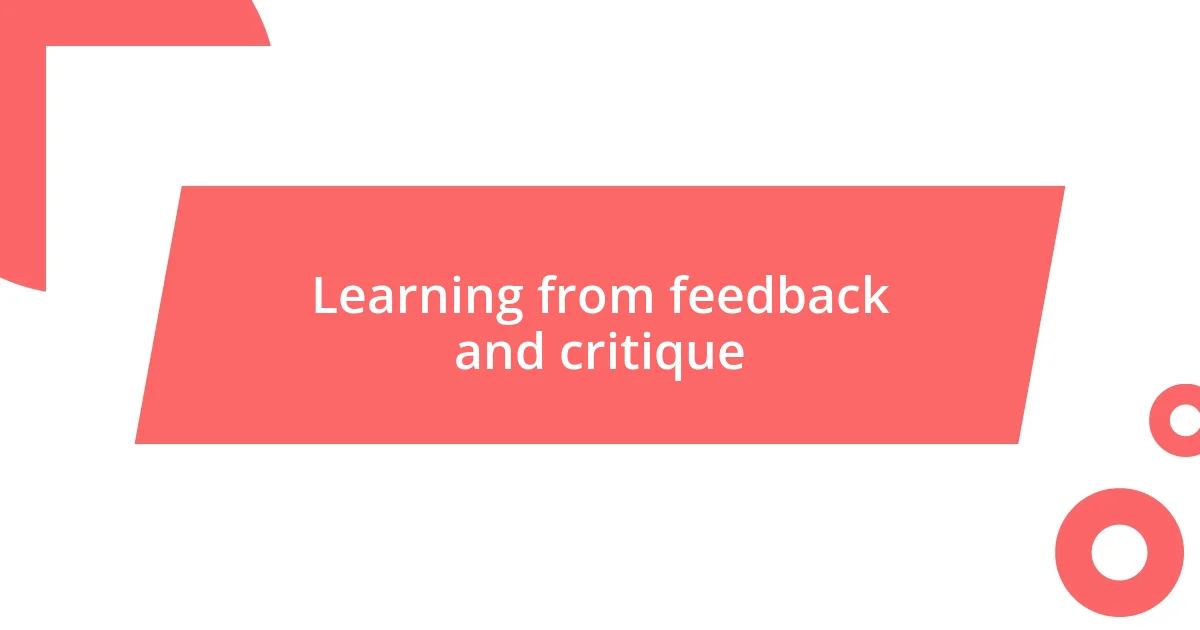
Learning from feedback and critique
When it comes to feedback and critique, I’ve learned it’s vital to embrace it fully, even when it’s tough to hear. I remember my first performance where I took a risk with my interpretation. Afterward, my mentor pointed out some areas where I could improve, not out of malice but from a place of genuine intention to help. It stung at first, but I realized that this feedback was an opportunity for growth, pushing me to refine my skills and elevate my craft.
Taking feedback is like having a mirror held up to your work; it can reveal both strengths and weaknesses. I once received a critique on my vocal performance that highlighted some pitch issues. Initially, I was defensive, wondering if the critic even understood my creative vision. But on deeper reflection, I took their advice to heart and engaged a voice coach. That decision improved not just my pitch but my confidence too. Have you ever noticed how sometimes the hardest feedback can lead to the most rewarding changes?
Moreover, the key to learning from critique lies in how we process it. I developed a habit of journaling after performances, noting down any feedback I received. Over time, I began to see patterns in the critiques that helped me identify recurring themes. This personal practice not only helped me track my progress but also shifted my perspective to view critique as a collaborative tool, strengthening my artistry rather than diminishing it. Isn’t it fascinating how a change in mindset can transform our approach to growth?
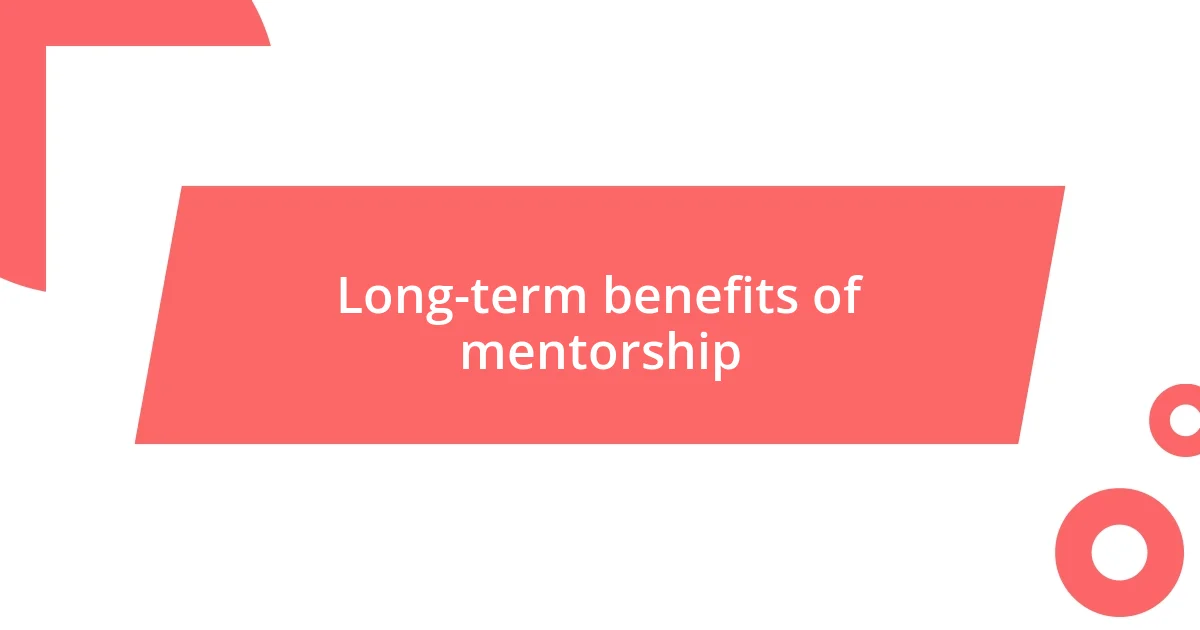
Long-term benefits of mentorship
Mentorship offers substantial long-term benefits that resonate beyond immediate skill enhancement. For instance, my mentor and I dedicated time to envision the kind of artist I wanted to become a decade from now. This practice grounded me in a broader perspective, allowing me to make choices today that would pave the way for that future—choices that continued to impact my career long after our sessions ended. Have you ever thought about how your present decisions shape your future?
As my career progressed, I realized that the network my mentor helped me build was priceless. I remember being introduced to seasoned professionals who had invaluable insights and opportunities. Those connections didn’t just unlock doors; they created a community where collaboration blossomed. It’s incredible how one introduction can lead to years of meaningful partnerships—doesn’t that highlight the ripple effect of mentorship in artistic growth?
Moreover, I found that the life skills acquired through mentorship—like resilience and adaptability—support me in all areas, not just performing arts. When faced with auditions or performances, I often reflect on my mentor’s lessons, reminding myself that rejection is part of the journey. This mindset shift has transformed setbacks into stepping stones, allowing me to embrace each challenge with renewed vigor. Have you ever noticed how your mentor’s teachings linger, guiding you through life’s ups and downs?










